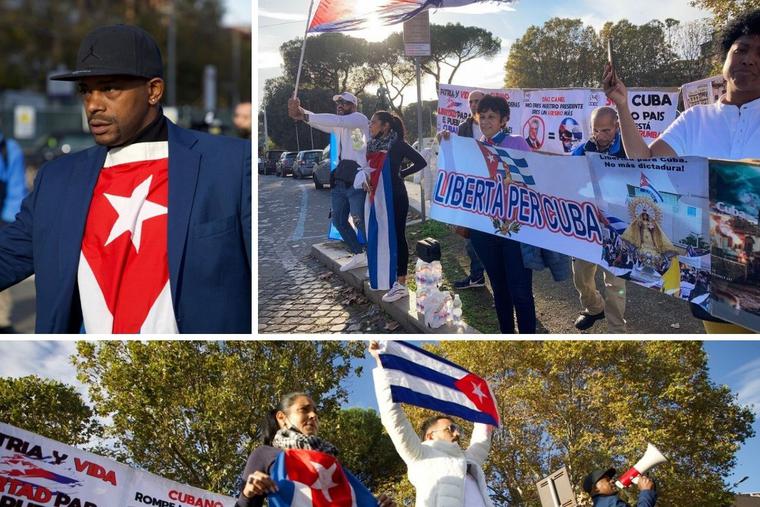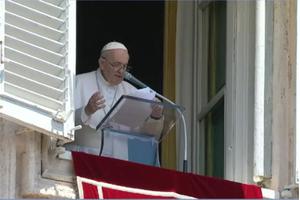Cuban Expatriates Worldwide Join Protests Against Cuba’s Oppressive Regime
‘My people are being killed by communism and the violence that goes with it,’ a Cuban participant in a demonstration in Rome told the Register.

ROME — A group of protesters in Rome joined thousands of others in 120 other cities around the world to demonstrate today against human-rights abuses and government repression in Cuba.
The Cuban expatriates, who gathered in Piazza Albania in central Rome, were protesting in solidarity with a “Cuban Civil Society March” taking place the afternoon of Nov. 15 in the communist-run island-nation.
The march in Cuba was organized by a group called Archipelago, a peaceful pro-democracy group made up of Cuban citizens. The protesters created a website in English documenting with videos the various acts of repression carried out recently by the Cuban regime.
“We’re here to protest against the Castro family,” said Ariel, a Cuban native who has lived in Italy for 16 years. “Cuba is poor, very poor, and in the past year, it has gotten worse,” he added. “The government decides everything for us.”
“My people are being killed by communism and the violence that goes with it,” said Kenia, also a Cuban expatriate living in Rome. “We’re making this peaceful demonstration for everyone in Cuba because it’s not really possible to protest and call for freedom there.”
To coincide with the protests, a group of human-rights defenders signed a statement Nov. 13 calling on the international community to condemn the Cuban government’s attempt “to repress and oppress” civil society and undermine democracy.
Entitled an “Appeal to World Civic, Religious and Political Leaders to Help Peaceful Cuban Dissidents and Oppose Cuban Government Violence Targeting Them,” the signatories stressed that not since 1989 has the International Committee of the Red Cross been able to inspect Cuba’s prisons (this is compared with around 100 visits the ICRC made to the nearby U.S.-run Guantanamo Bay prison from 2002 to 2014).
The signatories, who included religious leaders, writers, artists, businessmen and former diplomats, noted a “worsening period” of violent repression, including that of Father José Castor Alvarez Devesa, a Cuban Catholic priest who was beaten at a July 11 protest, detained by regime officials, and only released after his case drew international media attention.
Appeals Ignored
Despite the U.N. High Commissioner for Human Rights writing to the Cuban government expressing concern on July 16 over arrests of large numbers of people, including several journalists, and appealing for dialogue, the government’s response has been to “worsen the conditions of prisoners,” the signatories added.
“Over 5,000 Cubans were detained during and after the July 11 protests,” they explained. “Only 1,227 detained Cubans, related to the protests that began on July 11th, have been identified. The majority remain jailed with trials underway that fall far short of international norms; for example, peaceful protesters are being given prison terms in excess of 20 years for taking part in the demonstrations.”
The signatories issued a list of demands on the Cuban dictatorship that included the immediate release of all political prisoners, allow the ICRC to access Cuba’s prisons, and eliminate restrictions on distribution of humanitarian aid. They called on the international community to “denounce the crackdown of pro-democracy activists,” establish an “arms embargo” of the country, and “suspend economic and military cooperation agreements with the Cuban dictatorship.”
“We put out this appeal hoping it will open the eyes of the international community to stop normalizing the Castro regime, which has a terrible record,” John Suarez, executive director of the Center for a Free Cuba, told the Register.
Although Raul Castro, the brother of Fidel, was succeeded by President Miguel Díaz-Canel in 2019, many Cubans say the Castro family continues to wield power over the nation, which remains steadfastly communist.
Suarez’s organization co-organized a “Prayer Walk for Cuba” on Nov. 14 that finished at the Cuban Embassy in Washington, D.C. They then organized a second, civic walk on Monday afternoon that also ended at the embassy, where the participants called for an end to the violence in Cuba and read the names of political prisoners and martyrs of the dictatorship.
In the lead-up to the Nov. 15 protests, Cuban authorities “repeatedly and arbitrarily” detained organizers for short periods of time and threatened that if they proceeded with the civic march, legal action would be taken, according to the statement.
A pro-democracy Cuban site, DDC, reported Nov. 14 that Santiago de Cuba, the nation’s second-largest city after Havana, was “besieged” on Sunday by “snitches and paramilitary commandos,” adding that troops stood “ready to repress those who protest hunger, shortages and blackouts.”
It also reported that “interrogations, layoffs, persecutions, media lynchings, repudiation rallies, warning letters, fines, cancellation of internet accounts, telephone harassment, confiscation of mobile phones and threats of physical violence” took place preceding Monday’s march.
The Church’s Response
Last week, Cuba’s bishops called for the dignity of the nation’s citizens to be respected, adding that every Cuban “should be able to express and share freely and with respect his personal opinions, his thoughts or his convictions, even when he disagrees with the majority.”
In a statement issued after their plenary meeting, they also noted “an increasing urgency for the involvement of Cubans in a national project that involves and motivates everyone; that takes into account the differences, without exclusion or marginalization.” And they called for those imprisoned following the protests over the summer to be freed and no effort spared “to pave the way for understanding, reconciliation and to peace.”
The Catholic Church has been “courageous,” Suarez said, and he welcomed the bishops’ statement. “We’re calling on Catholic bishops around the world to join their Cuban counterparts.”
Pope Francis called for “peace, dialogue and solidarity” at the end of his Angelus address on July 18, at the height of the protests over the summer, but his appeals have otherwise been muted, causing some disappointment.
Ariel and many other Cubans were also disillusioned when they tried to enter St. Peter’s Square on Oct. 24 for the Pope’s Angelus address that day but were stopped by Vatican police on the grounds that political demonstrations were not permitted in the square. They contrasted their denied entry with the July 18 Angelus, when many of them were allowed in with flags and banners.
Kenia was happy that Cuba’s bishops were supporting their protest. “I’m very happy about this,” she told the Register, and she said she was not concerned by what happened in the square.
“It was no problem they stopped us,” she said. “I love God, and I know God is with every Cuban and every person.”
- Keywords:
- cuba protests
- edward pentin
- cuba


















